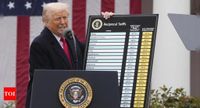Jaguar Land Rover (JLR), the British luxury vehicle manufacturer, has announced a temporary halt on shipments to the United States for April 2025, a direct response to the newly implemented tariffs on imported automobiles by the Trump administration. The 25 percent tariff, which took effect on April 3, 2025, marks a significant shift in trade policy that poses challenges not only for JLR but also for other British luxury automakers.
The decision to pause exports comes just days after the tariffs were enacted, reflecting the immediate impact of U.S. trade policy on global automotive trade. JLR does not operate any manufacturing plants in the United States, relying instead on exports from its facilities in the United Kingdom and other international locations. In the final quarter of 2024, the company shipped approximately 38,000 vehicles to the U.S., including popular models such as the Jaguar F-Pace, Range Rover Sport, and Land Rover Defender.
“The U.S.A. is an important market for JLR’s luxury brands,” the company stated in an official announcement. “As we work to address the new trading terms with our business partners, we are enacting our short-term actions, including a shipment pause in April, as we develop our mid- to longer-term plans.” This pause in shipments is expected to be a temporary measure as JLR reassesses its supply chain and pricing strategies in light of the new tariffs.
The U.S. market represents a crucial segment for JLR, accounting for roughly 20 percent of its global sales. In the financial year ending March 2024, the company sold about 95,000 vehicles in the U.S., generating £6.5 billion in revenue. However, the new tariff could significantly increase the retail price of JLR vehicles in America, potentially adding thousands of dollars to the sticker price, which could deter consumers.
Other British luxury automakers, including Bentley and Aston Martin, also face similar challenges due to their lack of U.S.-based production facilities. Historically, these companies have deemed it economically unfeasible to establish manufacturing operations in the United States, leaving them particularly vulnerable to shifts in trade policy.
The Trump administration's decision to impose a 25 percent tariff on imported automobiles is part of a broader protectionist agenda. This move, announced on what President Trump dubbed "Liberation Day," also includes a 10 percent tariff on other British goods, although specifics on affected product categories remain limited.
British officials have so far refrained from retaliatory action, emphasizing a preference for diplomatic engagement. The U.K. government has indicated it is prioritizing negotiations with the United States on a trade agreement focused on the technology sector. However, officials have initiated a four-week consultation period with domestic businesses to identify potential U.S. products that could be subject to retaliatory tariffs should talks fail to make progress.
The United States is Britain's second-largest trading partner after the European Union, with trade in services dominating the economic relationship. In 2023, the U.K. exported approximately £60 billion worth of goods to the United States and imported around £58 billion, according to the Office for National Statistics.
JLR's announcement comes amid broader market uncertainty. Shares in Tata Motors, JLR’s Indian parent company, have fallen more than 9 percent over the past week, reaching their lowest level since mid-2023. Investors appear concerned about the near-term implications of U.S. tariffs on JLR’s earnings and the company’s ability to maintain competitiveness in one of its most lucrative markets.
While JLR has not provided a specific timeline for the resumption of shipments, the company’s decision underscores the mounting difficulties for foreign automakers operating in the U.S. under the new trade regime. The automaker is expected to reevaluate its supply chain and pricing strategies in the coming months as it seeks to adapt to evolving transatlantic trade dynamics.
In the meantime, the pause in shipments is a significant move that highlights the challenges faced by luxury automakers in navigating the complexities of international trade. As these companies work to adjust to the new tariffs, consumers in the U.S. may soon feel the effects in the form of higher prices and potentially limited availability of luxury vehicles.
As the situation develops, industry observers will be watching closely to see how JLR and other affected automakers respond to the changing landscape of international trade and what strategies they will employ to mitigate the impact of these tariffs on their operations.








